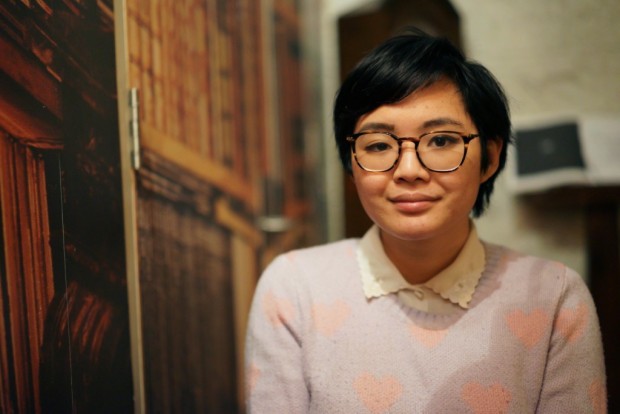SEXtember: Giselle Au-Nhien Nguyen talks about her first time and how it changed her perspective on sex
TO MOST people who originate from conservative Asian societies, it’s hard to just talk about sex without embarrassing anyone. Writer Giselle Au-Nhien Nguyen spoke with Trinh Le about her own story of overcoming this fear and why it’s important to open up about it.

Giselle Au-Nhien Nguyen is an Australian feminist writer who comes from a Vietnamese background. | Photo by Trinh Le.
Born in Sydney to Vietnamese refugee parents, not many suspected that Giselle Au-Nhien Nguyen would become a freelance columnist covering sex, feminism, pop culture, race and relationships.
“For a long time I was just going along with what [my parents] said about sex, like ‘No sex before marriage’,” Nguyen said. “But as I got older, I was getting more interested in feminism and meeting other people. I guess it’s different for me because I’m living in a society that is not too conservative.”
I looked at the short-haired, twenty-something lady in front of me. We were sitting in a bustling café in the heart of Melbourne. Nguyen wore a light purple heart print sweater. She ordered scented tea.
“The first time I wrote about sex was when I had this pain problem with sex. I think it’s just because I felt guilty about having sex because of how I was brought up,” explained the feminist writer. “I was really nervous – it really hurt – and it didn’t stop hurting for, like, five years.”
Her first op-ed for Rookie, Closed for Business: How I learned to deal with vaginismus, proved to be popular among online readers. Many other girls soon approached Nguyen with questions about vaginismus yet had never heard of the term before – understandable given how little it is discussed in the media.
I felt guilty about having sex because of how I was brought up.” – Giselle Nguyen
It took great courage for Nguyen to actually discuss sex publicly as her father was a prominent figure within the Vietnamese community in Australia, and she was concerned about how her writing would reflect upon her family.
However, Nguyen had a very different perspective on sex.
“The thing is people are just going to do it anyway, right?” she said. “Even if the culture is conservative, people are still going to [have sex]. If they’re not getting the education, that’s how people get teen pregnancy, STIs, and so on.”
She continued, explaining how her own education at a religious school didn’t lead to a good experience.
“Their sex education is not really an education – they’re like, ‘Do not have sex. And if you do, you’ll probably get AIDS and die.’ It’s not useful […] It’s better to be like, here, you should use protection.”
I took a sip of my latte and dwelled on Nguyen’s stories. Coming from Vietnam, her experiences were new to me. Sex was taboo in my country, even though adults did enjoy telling dirty jokes over beers.
International students coming to Australia may face similar problems like Nguyen and for some, casual conversations about sex will feel awkward, even among friends of their age. Talking about it with their parents is already a big no-no and it would never occur to them that professional help for sexual health, gender, or relationship counselling, could be sought.
Inevitably, the internet would become the international student’s best resource to learn about all of this but in the age of social media, Nguyen emphasises the importance of fact-checking.
“My advice is to always cross-check with legit sources, such as government resources. You can tell if a source is legit or not with some logic.”
Their sex education is not really an education – they’re like, ‘Do not have sex. And if you do, you’ll probably get AIDS and die.’ It’s not useful.” – Giselle Nguyen
Nguyen was also concerned with the rise of seduction communities, in which “pick-up artists” share with other men tricks on how to seduce and achieve sexual success over women, usually by lowering their self-esteem and regarding them as “possession”.
“Men always feel that they’re entitled to sex,” said Nguyen. “The way sex is portrayed in the media, it’s always for men’s pleasure, while women are secondary to that. Many women don’t know that they have a right to enjoy sex. They don’t know that sex is about their pleasure as well.”
“Do you think it is a cultural construct, or is it a universal phenomenon,” I asked. “And how should we deal with it?”
“People usually hide behind culture as an excuse for their bad behaviours. Of course we should respect cultural differences, but I don’t think the concept of women as equal to men is too radical,” answered Nguyen. “I don’t know what’s happening in Asia right now, but in the Western context, there’s a cultural shift. More and more women are talking openly about sex now.”
“Well, in Asia, if you openly express your sexual identity, you might be disowned by your family or rejected by your society,” I commented.
“In an ideal world, people can just be open about who they are without the fear of being rejected. But we don’t live in that ideal world,” said the writer.
“The reason I write about sex is because I want to change the perspectives of as many people as possible, but I understand that we have cultural differences, and I am lucky that my parents are very supportive, even though they don’t necessarily agree with everything I say.”
